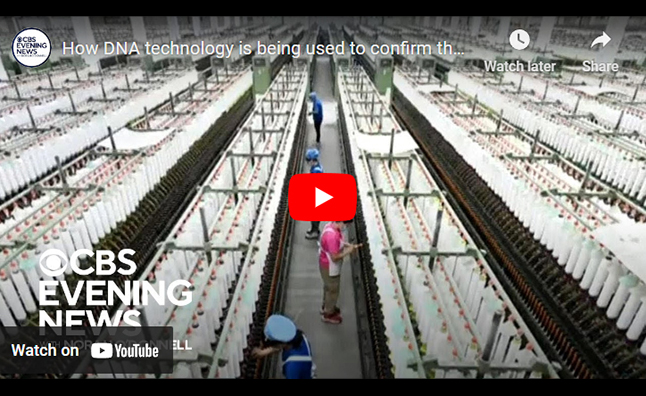CertainT enables you to truly know your cotton supply chain, from fiber to finished product. The platform comprises 3 technologies: DNA Molecular Tagging, Genotyping and Isotopic Analysis. As there are different types of cotton grown in many countries around the world, there is no “one-size-fits-all” approach to verifying cotton claims. By using multiple proof points, a CertainT solution can be configured to fit the needs of your supply chain.
For over 15 years, we have worked brands and manufacturers to demonstrate the breadth and scale of our DNA molecular tagging and authentication testing services. CertainT’s Partners in Proof are a global network of trusted companies that are committed to elevating their supply chains.
Since the enactment of UFLPA in 2022, there is increased demand for transparency in cotton supply chains with regard to importation of cotton from high-risk regions like Xinjiang. CertainT can help clients prepare for UFLPA by identifying supply chain vulnerabilities and providing a comprehensive due diligence plan that fits their unique needs and budget.
The CertainT platform is designed to be flexible, secure and cost effective by providing multiple solutions to enable authentication for cotton of any type or origin, ensuring that the cotton used in your supply chain can be verified at all stages of the supply chain.
CertainT Isotopic Analysis provides evidence of origin at multiple checkpoints throughout the supply chain. For cotton textile products, we conduct stable isotope testing of carbon, hydrogen and oxygen. These provide innate chemical evidence of geographic and industrial provenance.
Yes. Please refer to CBP’s FAQ about Uyghur Forced Labor Prevention Act (UFLPA) Enforcement.
We do not believe testing on its own will prevent a shipment from being detained or stopped from entering the U.S. All goods being imported into the U.S. should have corresponding documentation and evidence that there is no nexus to Xinjiang. This applies to materials at any stage of the manufacturing process, from fiber all the way to finished product.
DNA Molecular Tags, Genotyping and Isotopic Analysis.
DNA Molecular Tags are precision-engineered to be applied to or embedded in materials, components, finished products and packaging. DNA molecular tags can be used to confirm attributes such as authenticity, provenance and intended distribution path in your supply chain. Each tag is custom made for your unique brand, and no two tags are the same.
Genotyping, or genomic testing, is DNA analysis of specific biomarkers used to distinguish different cotton families or varietals or distinguish genetically modified cotton.
Isotopic analysis is the analysis of carbon, hydrogen and oxygen elements that provide evidence of the physical product’s origin. The test uses specialized equipment called IRMS (Isotope Ratio Mass Spectrometry) to analyze each isotope.
DNA tagging is the best way to ensure that the cotton is linked directly to your supply chain. Origin or genotyping testing on its own is ”indicative” of where the cotton comes from BUT is not ”conclusive”. The same test can be done on anyone’s product, even on counterfeits, and you would not know it was really your cotton in your supply chain. Therefore, ”if you tag it, you own it”.
Applied DNA developed a system that addresses the complexities and uncertainties in cotton supply chains in 3 ways:
Origin – verify cotton origin using genomic testing and/or isotope analysis.
Integrity – by tagging cotton, we can confirm that all stages of the supply chain from fiber to finished goods are authenticated based on the product claims. Tagged cotton ensures that all cotton is linked to your specific supply chain.
Authenticity – verify your brand’s IP and products/packaging. DNA tagging can be used in coatings, labels, thread to ensure that your brand is protected enabling you to check products quickly in store as well as in your supply chain.
DNA testing uses methods such as PCR (polymerase chain reaction) to detect the presence of specific DNA sequence or biomarker. Some types of cotton such as Pima, Egyptian, and Organic cotton contain ”DNA” that enables us to test for the actual DNA present (or not). Since 2009, we have developed patented and proprietary methods to DNA test fiber, yarn, fabric and finish products. DNA testing can be useful for specific ”claims” related to the type of cotton and can be used with isotope testing to confirm the overall provenance of cotton.
Isotope testing uses IRMS (Isotope Ratio Mass Spectrometry) to detect the origin of the product. For cotton, the isotopes we analyze are carbon, hydrogen and oxygen. These ratios may be impacted by a range of external naturally occurring variables such as precipitation, latitude, longitude, altitude, and soil, to name a few. This “origin fingerprint” may be similar or different depending on where the cotton is grown. Isotope testing can be useful for geographic origin, but used on its own it may not be useful if different if different types of cotton are grown in the same farm, or if there is a similar fingerprint shared across similar farms or regions. Therefore, DNA tagging and/or testing may provide greater resolution as to the exact cotton used in the specific supply chain.
Blockchain and digital tracking systems are useful for tracking the movement of products in a supply chain, but cannot determine cotton origin or content as they do not involve physical authentication of the product itself. These systems are only as good as the information that is inputted into the digital databases, which may or may not be accurate.
